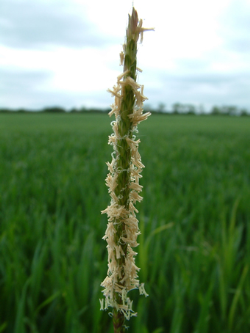
A breakthrough herbicide that gives winter wheat and winter barley growers a brand new option for tackling the UK's growing black-grass problem, while maintaining high levels of crop safety, is being launched for this autumn.
Defy from Syngenta is designed for using as the first spray in a herbicide sequence – at the pre-emergence timing – before weeds have chance to compete with the crop. Besides black-grass, it also tackles rye-grass, annual meadow-grass and a range of broad leaved weeds, Syngenta technical manager Iain Hamilton points out.
"With black-grass control becoming increasingly difficult, and resistance spreading – even to recent herbicide chemistry – pre-emergence herbicide use is ever more important," explains Mr Hamilton, "and has more than doubled in winter wheat in the last four years.
"As well as providing a solid start to control programmes, a pre-emergence herbicide such as Defy also reduces pressure on later herbicides, and offers flexibility with later herbicide choice.
"Within this, the biggest breakthrough for Defy is that it not only provides an effective new alternative to current pre-emergence treatments, but also combines that with advanced levels of crop safety, plus exceptional versatility in the way it can be used.
"All these should give growers new confidence to make use of this valuable timing for dealing with problematical grass weeds, plus new confidence that crops won't be held back during vulnerable early stages of growth."
Whilst good levels of grass weed control have been achieved using Defy at the full label dose, Mr Hamilton says tank mixing with another herbicide hits grass weeds harder with two modes of action, and allows a lower dose of Defy, for a more cost-effective result.
"Importantly, Defy is at low risk from metabolic resistance and is not affected by target site resistance," he explains. "And it allows growers to target weeds with a different chemical class to current herbicides such as pendimethalin and flufenacet, plus fops, dims and sulfonylureas.
"Against black-grass, we're advocating 4 l/ha of Defy mixed with 2 l/ha of trifluralin. Against rye-grass, we suggest mixing 4 l/ha of Defy with chlorotoluron. Trials using these mixtures have shown similar or even improved control of their respective weeds over a current leading pre-emergence herbicide standard. Equally significantly, Defy has demonstrated a greater margin of crop safety where seedbed conditions were not ideal," he adds.
Pointing to winter wheat and winter barley crop safety results, Mr Hamilton says no negative long-term effects on crop stand were seen even following a high dose of Defy with trifluralin – and even when crops were drilled at less than the optimum 3cm depth.
"The significance of this is that while growers should always aim to drill cereal seed at least 3cm deep, in practice this may not be easy – since issues such as uneven field surfaces and varying soil types can affect drilling depth. With its good crop safety, Defy should give growers greater confidence about using a pre-emergence herbicide after drilling.
"In addition, Defy is also very versatile in terms of spray timing and using in moist or dry seasons," he adds.
While spraying pre-emergence, around the time that weed seeds are chitting, is optimal, Mr Hamilton says Defy remains active even if application is delayed to peri-emergence, when weeds are just poking through. Similarly, even in a dry season, when lack of moisture might limit herbicide uptake, trials showed that consistent control of black-grass was still maintained.
"In summary, with pre-emergence herbicides having growing significance for tackling tough weeds such as black-grass and rye-grass, Defy offers growers an effective, crop-safe and versatile new choice."
